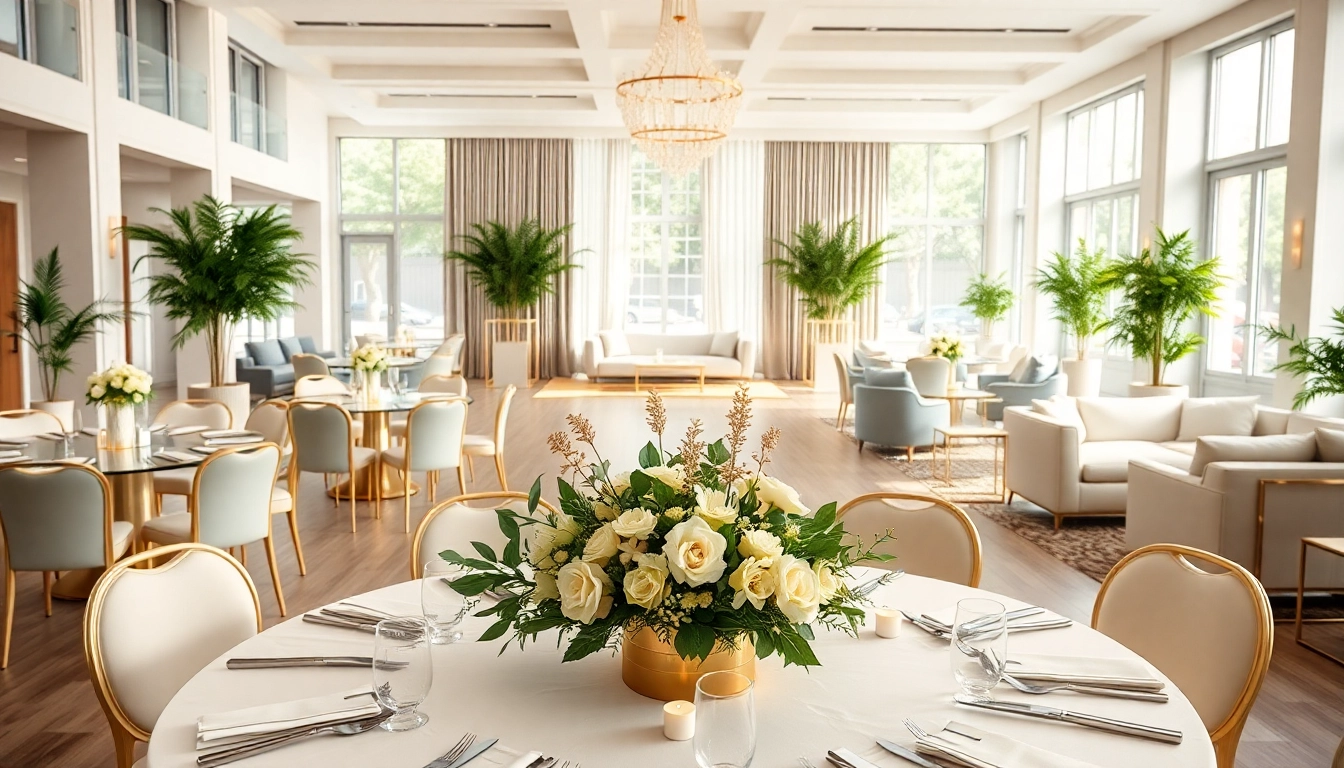Understanding Your Event Space Needs
When planning an event, selecting the right event space is crucial to its success. The perfect venue sets the ambiance, influences guest experience, and can even elevate the event’s overall perception. This comprehensive guide will help you navigate the intricacies of choosing an event space that aligns with your vision, budget, and needs.
Identifying Event Types
The first step in your venue selection process is understanding the type of event you are planning. Different events have unique requirements; for instance, a corporate conference demands professional settings, while a wedding focuses on romance and aesthetics. Common types of events include:
- Corporate Events: These may include meetings, workshops, product launches, and conferences, often requiring professional environments equipped with technology and adequate seating arrangements.
- Social Gatherings: This category includes birthday parties, anniversaries, and casual meet-ups, which can vary widely in setting from formal to relaxed.
- Weddings: Weddings warrant picturesque surroundings and plenty of space for various rituals, ceremonies, and receptions.
- Exhibitions and Trade Shows: These events require ample space for booths, displays, and foot traffic, alongside technical facilities.
Identifying the type of event will inform many of your decisions moving forward, ensuring that your chosen space meets functional demands.
Guest Capacity Considerations
Another essential factor is understanding guest capacity. Each venue has a maximum capacity, and choosing one that can comfortably accommodate your expected guests is crucial. Overcrowding can lead to an uncomfortable experience, while an excessively spacious venue may feel empty. Consider these aspects:
- Seated vs. Standing Events: Events that require seating, such as formal dinners and ceremonies, typically need more space allocated per guest. Standing events, like mixers, can accommodate more individuals in a smaller footprint.
- Venue Layout: The shape of the space can affect how well you can fit guests. For example, a long, narrow room may not be suitable for a large seated banquet, while a wide, open venue is more flexible.
- Flow and Accessibility: Ensure there’s enough space for movement, including ingress and egress points, and that guests can navigate efficiently around the venue.
Budgeting for Your Event Space
Budget constraints are often the guiding factor for event planners. Understanding what you can afford will help narrow down options significantly. Some key considerations are:
- Rental Fees: Venues often charge different rates depending on the day, time, and season; weekdays or off-peak times generally come at a discount.
- Hidden Costs: Be aware of additional charges such as cleaning fees, insurance, and overtime rates for staff or security.
- Inclusions: Some venues come with amenities included in the rental cost, such as sound systems, furniture, lighting, and catering. Clarify what is included and what will cost extra.
It’s advisable to create a detailed budget that outlines potential costs beyond just the rental price to ensure a smooth planning experience.
Types of Event Spaces Available
When selecting an event space, it’s critical to evaluate the variety of options available. Each type of venue brings unique qualities and atmospheres that cater to different needs and styles.
Indoor Event Space Options
Indoor venues provide climate control and shelter from elements, making them ideal for year-round events. Common types of indoor spaces include:
- Ballrooms and Banquet Halls: These are perfect for formal events like weddings and corporate dinners, often featuring luxurious decor and flexible configurations.
- Conference Rooms: Ideal for business meetings and workshops, they usually come equipped with necessary technology and professional seating arrangements.
- Studios and Galleries: These unique spaces often serve as artistic settings for exhibitions, soirées, or creative workshops that aim for an inspiring backdrop.
Outdoor Event Space Possibilities
Outdoor venues embody a sense of freedom and connection to nature, perfect for casual and celebratory events. Consider these types:
- Parks and Gardens: Often scenic and tranquil, they are suitable for weddings, picnics, and family gatherings, often requiring additional logistics for amenities like power.
- Rooftop Venues: Offering stunning views of city skylines, these cater to a variety of events, from cocktail parties to corporate celebrations.
- Beaches and Waterfronts: Perfect for relaxed atmospheres, these venues require thorough logistical planning, especially regarding permits and weather contingencies.
Unique and Alternative Event Spaces
If you are looking to make your event memorable, consider unique spaces such as:
- Historic Sites: Venues like museums, historic homes, or heritage sites can add character and intrigue to an event.
- Industrial Spaces: Warehouses and factories can be transformed into stunning venues with a modern, urban aesthetic.
- Private Residences: Renting a home can offer a personalized and cozy atmosphere, particularly for social events.
Key Features to Look For in an Event Space
With the various types of event spaces available, you’ll want to narrow down your options based on essential features that align with your event requirements.
Location and Accessibility
The location of your event space can dramatically influence attendance and guest satisfaction. Consider the following:
- Proximity to Public Transport: Choosing a venue close to transportation hubs can ease travel for guests, especially in urban areas.
- Parking Facilities: Availability and accessibility of parking can play a significant role in guest convenience.
- Neighborhood Safety and Amenities: A location in a safe, vibrant area with additional dining or entertainment options can enhance the overall experience.
Facilities and Amenities
Different events require different amenities. When assessing venues, take note of the following:
- Wi-Fi and Technology: Look for spaces with up-to-date audio/visual equipment, Wi-Fi accessibility, and technical support to facilitate presentations or entertainment.
- Seating and Furniture: Ensure the venue has the necessary chairs, tables, and additional furniture that aligns with your vision.
- Restroom Facilities: Ample restroom facilities are crucial, especially for larger events.
Technical Capabilities for Events
Modern events often rely heavily on technology. These specifics are vital:
- Sound Systems: Ensure the venue has quality sound systems suitable for speeches, music, or presentations.
- Lighting Options: Effective lighting can create the right ambiance, so assess what options are available for customization.
- Connectivity: Reliable internet connectivity is essential for events that require live streaming or interactive elements, so check for availability and speed.
Best Practices for Booking an Event Space
Once you have narrowed down your options, it’s important to follow best practices in securing your selected venue to ensure a seamless experience.
Research and Compare Options
Take the time to compare different venues by creating a spreadsheet or chart to track pros and cons. Consider aspects such as:
- Cost per hour/day
- Available amenities
- Location and accessibility
Seek reviews from previous clients or conduct site visits to better understand how each venue meets your needs.
Site Visits Before Finalizing
Always schedule a visit to potential venues. Pictures online can be misleading, and a walkthrough will give you a genuine feel for the space. Pay attention to:
- The layout and how it fits your event’s needs
- General cleanliness and maintenance
- Atmosphere and surrounding environment
Understanding Rental Agreements
Before signing any contract, ensure you thoroughly understand the rental agreement. Be vigilant about key terms such as:
- Refund and cancellation policies
- Deposit requirements
- Time limitations on venue use
- Insurance and liability clauses
Maximizing Your Event Space Experience
Once the event space is booked, there are several strategies you can implement to optimize the experience for your guests.
Decor Tips to Enhance the Space
Transforming a venue can significantly impact the feel of your event. Here are some ideas:
- Lighting: Use soft lighting to create a warm atmosphere or dramatic lighting for events that require a lively vibe.
- Centerpieces: Create thematic centerpieces to draw attention to the tables, whether they are floral arrangements, candles, or custom-designed elements.
- Color Schemes: Staying consistent with a color palette can unify the decor and contribute to an overall cohesive design.
Engaging Guests in the Event Space
Creating a memorable experience involves engaging attendees. Consider the following:
- Interactive Stations: Whether it’s photo booths, craft tables, or informational kiosks, interactive elements keep guests entertained and involved.
- Networking Opportunities: Particularly for corporate events, having designated areas for networking helps foster connections among attendees.
- Entertainment: Hiring performers or speakers can create a memorable experience that will be talked about long after the event concludes.
Feedback and Follow-up Post-Event
Once your event concludes, it’s crucial to gather feedback from participants. This can be done through:
- Surveys: Use online tools to distribute surveys that assess various aspects of the event, from the venue to the overall experience.
- Reflective Meetings: Have a post-event team meeting to identify what worked, what didn’t, and how future events can be improved.
- Thank You Notes: Sending out thank you notes to attendees and vendors not only expresses gratitude but also opens a line of communication for future events.
In conclusion, securing the right event space is pivotal to the success of any gathering. By understanding your needs, researching options, and implementing best practices, you can create an event that wow your guests and fulfills your vision.



